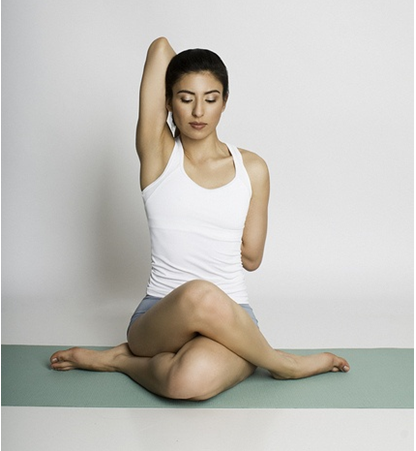11. Creating Trust:
This relates to creating trust in oneself and in others by bringing into awareness mental and emotional blocks, and how these can be released in order to create trust.
Asana: PaschimOttAsana or sitting forward bend
Description With legs extended straight and in sitting position, the upper body stretches from pelvis, arms over head, bends forward, hands reaching towards the feet
Symbolism: Intense stretch to the far west
 [xxi]
[xxi]
| Language of the Body | Language of the Mind |
| Bending forward, stretching to the unfamiliar,aware of the pain and the restrictions. |
|
12. Listening and Receptivity:
The purpose is to bring into one’s awareness any resistance to receiving and to develop openness to receiving, listening, being engaged and not in action.
Asana: GomukhAsana or the Cow pose
Description: From a kneeling position, the left leg is brought over the right and the weight of the body is made to rest on the crossed legs. The right hand is raised and bent back to touch below the nape of the neck while the left hand is bent to reach and clasp the right.
Symbolism: The receptivity and humility of the cow
 [xxii]
[xxii]
| Language of the Body | Language of the Mind |
| Opening the chest, reaching out, clasping,attentive |
|
V. CONCLUSION
The roots of coaching can be traced to fields namely management, consulting, psychology and spirituality. Today coaching has come to occupy a unique place in that it serves the needs of individuals that aspire to take a step forward in their life journeys. The field of coaching is growing and embracing with it allied areas that serve to enhance its effectiveness for the client and the coach. Yoga with its ancient origins and similarity in goals of achieving awareness and growth for the individual not only contributes to the field of coaching but could also enhance its richness by offering a blend of body-mind-emotion understanding for the individual.
Our body doesn’t (…) end at the end of our skin because what is close to us is not necessarily what is next to us physically. So our body extends to wherever and to whenever our concern exists.
(Flaherty, Coaching, 2010)
Yoga offers the opportunity to listen to and learn from the body even as we make discoveries during the coaching process. Yoga woven into coaching could be an integrated program designed to move the person forward. Specific postures or Asanas combined with a keen awareness evoked in the body, mind and emotional planes offer immense possibilities to the individual to recognize beliefs that constrict and hold back movement towards the goal. Yoga classes conducted in a corporate environment at California help students realize where they are holding tension-physical, mental or emotional.[xxiii]
Yoga could serve as a useful tool for self-care and self-development for the coach by creating a life of direction, trust, openness, mindfulness, knowledge of self, connectedness, perception and lightness. To quote the deputy general counsel at General Mills where yoga has been practised for seven years now,
It’s about training our minds to be more focused, to see with clarity, to have spaciousness for creativity and to feel connected.